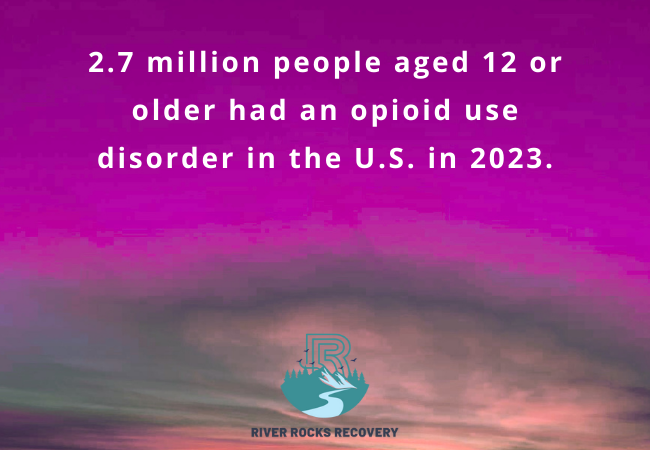For individuals and families struggling with opiate addiction, choosing the right rehab program can feel overwhelming. You may wonder, “Will this work for me?” or “How do I know what level of care I need?” You’re not alone in asking these questions—and they matter.
At River Rocks Recovery, we know that recovery is not one-size-fits-all. That’s why we provide a range of tailored, evidence-based Addiction Treatment Programs in Middletown, Ohio, helping individuals at every stage of their journey. Whether you need full-day support or more flexible scheduling, our team walks beside you every step of the way.
This blog will help you:
- Understand the types of opiate rehab programs available
- Assess your personal and clinical needs
- Evaluate treatment program quality
- Learn what to expect from our services at River Rocks Recovery
- Take action toward a life free from addiction
The Importance of the Right Rehab Program
Opiate addiction is a chronic, relapsing condition that affects brain chemistry, mental health, relationships, and quality of life. According to the National Institute on Drug Abuse (NIDA):
- 2.7 million people in the U.S. had an opioid use disorder in 2023.
- Relapse rates for opiate addiction are as high as 60% without proper treatment and aftercare.
- Long-term outcomes are significantly improved with a matched level of care, including mental health support.
Choosing the right program increases your chance of lasting recovery. The wrong program—one that’s too short, too light, or not trauma-informed—can set you back rather than move you forward.
Understanding the Spectrum of Opiate Rehab Options
At River Rocks Recovery, we offer multiple levels of care. Each level supports a specific stage of healing—from early withdrawal to reintegration into daily life.
1. Partial Hospitalization Program in Middletown, Ohio (PHP)
PHP offers intensive, full-day support without overnight stays. It is often the first step after detox or hospitalization.
Who It’s For:
- Clients with moderate to severe opiate addiction
- Individuals needing daily clinical support
- People with co-occurring mental health conditions
What It Includes:
- 5–6 hours of therapy per day, 5 days per week
- Psychiatric care and medication management
- Dual diagnosis therapy (CBT, DBT, trauma treatment)
- Case management and discharge planning
- Group and individual counseling
PHP allows you to focus exclusively on recovery while sleeping in your own home or a sober living environment.
2. Intensive Outpatient Program in Middletown, Ohio (IOP)
IOP offers structured treatment several days a week while allowing clients to resume work, school, or family responsibilities.
Best For:
- Those stepping down from PHP
- People with strong home support
- Clients needing flexibility
Key Features:
- 3–5 sessions per week (days or evenings)
- Group and individual therapy
- Relapse prevention and life skills training
- Continued mental health support
IOP bridges the gap between structure and independence—making it ideal for building recovery into your real-life routine.
3. Outpatient Treatment Program in Middletown, Ohio
This program offers minimal structure and maximum flexibility, often used as aftercare or for long-term support.
Who Benefits Most:
- Individuals with strong stability and support systems
- Those in recovery for 6+ months
- Clients with work, education, or caregiving obligations
What’s Included:
- Weekly or biweekly therapy
- Medication management (if applicable)
- Alumni support and peer recovery events
- Crisis support and relapse prevention
How to Assess Your Needs Before Choosing a Program
To choose the best rehab option, consider the following critical dimensions:
1. Addiction Severity
- Are you using daily or multiple times a day?
- Have you experienced withdrawal symptoms?
- Have you overdosed in the past?
Severe use may require PHP. Milder symptoms might be managed with IOP.
2. Mental Health Diagnosis
- Have you been diagnosed with depression, anxiety, PTSD, or bipolar disorder?
- Do you experience trauma flashbacks, mood swings, or panic attacks?
If so, you need a dual diagnosis program, which we provide in all levels of care.
3. Support Environment
- Do you live in a safe, drug-free home?
- Do you have family or friends involved in your recovery?
If not, higher structure (like PHP) or sober living is recommended.
4. Life Responsibilities
- Do you need to care for children or work full-time?
- Are you in school or caring for an elderly parent?
Flexible options like IOP or outpatient rehab can provide support without disrupting your life.
Key Program Features to Evaluate
When researching opiate rehab programs, look for these essential elements:
Evidence-Based Therapies
- Cognitive Behavioral Therapy (CBT)
- Dialectical Behavior Therapy (DBT)
- Motivational Interviewing
- Trauma-informed care (e.g., EMDR)
At River Rocks Recovery, all therapies are backed by science and delivered by licensed professionals.
Medication-Assisted Treatment (MAT)
MAT helps manage cravings, reduce relapse risk, and support brain healing. We offer:
- Suboxone
- Buprenorphine
- Naltrexone (Vivitrol)
Medication is optional and based on your unique clinical profile.
Dual Diagnosis Integration
We specialize in treating both opiate addiction and mental health disorders, including:
- Depression
- Anxiety
- Trauma/PTSD
- Bipolar disorder
- Personality disorders
Family Support Services
Addiction affects families too. Our programs include:
- Family therapy
- Education about addiction and recovery
- Boundary-setting and communication tools
Aftercare and Continuum of Support
We help you plan for life after treatment with:
- Alumni programs
- Peer recovery support
- Continued therapy or outpatient care
- Relapse crisis planning

How Much Does Opiate Rehab Cost?
Costs vary depending on the level of care and length of treatment. However, many people don’t realize that insurance often covers part or all of rehab.
At River Rocks Recovery, we accept most major insurance providers. Our admissions team helps with:
- Insurance verification
- Payment planning
- Medicaid/Medicare navigation (if applicable)
Tip: Don’t let cost delay your decision. The cost of untreated addiction—health complications, lost wages, damaged relationships—is always higher.
River Rocks Recovery: Your Partner in Lasting Change
We’re more than a rehab center—we’re a partner in your lifelong recovery journey. Our Addiction Treatment Center in Middletown, Ohio offers a full range of services, including:
- Opiate Rehab Treatment in Middletown, Ohio
- Drug Rehab Treatment in Middletown, Ohio
- Dual Diagnosis Care
- MAT and mental health services
- Partial Hospitalization, IOP, and Outpatient Programs
Our team is made up of licensed professionals, peer recovery coaches, and compassionate caregivers who believe in your potential to heal.
Ready to Take the Next Step?
If you or your loved one is struggling with opiate addiction, don’t wait. The right help is available—and it starts with a conversation.
Your journey toward freedom from opiates starts with a single step—and the right support system. At River Rocks Recovery, we help you choose the path that fits your life, your needs, and your future. Call us now at 888-905-6281 to schedule a free, confidential assessment. Explore the difference our Addiction Treatment Programs in Middletown, Ohio can make—because you deserve more than just sobriety. You deserve a life worth living.
FAQ on Choosing the Right Opiate Rehab Program
What types of opiate rehab programs are available in Middletown, Ohio?
At River Rocks Recovery, we offer a full continuum of care, including:
-
Outpatient Treatment Program in Middletown, Ohio Each program is designed to support a different stage of recovery and is tailored to individual needs.
How do I know which level of care is right for me?
Choosing the right program depends on your addiction severity, mental health status, support system, and daily responsibilities. Our team offers free assessments to help determine whether PHP, IOP, or outpatient care is the best fit for you.
Can I still go to work or school during treatment?
Yes. Our IOP and outpatient programs are specifically designed for people who need flexibility to continue their work, education, or caregiving duties while receiving clinical support for recovery.
Does River Rocks Recovery treat co-occurring mental health disorders?
Absolutely. We specialize in dual diagnosis care, treating conditions like depression, anxiety, PTSD, and bipolar disorder alongside opiate addiction. Our integrated approach supports long-term healing and relapse prevention.
Is medication-assisted treatment (MAT) available at your center?
Yes. River Rocks Recovery offers MAT options such as Suboxone, buprenorphine, and naltrexone (Vivitrol) for clients who can benefit from these medications as part of a comprehensive treatment plan.
What happens after I complete the rehab program?
We provide personalized aftercare plans that may include continued outpatient therapy, alumni programs, relapse prevention, and referrals to sober living environments. Recovery is a lifelong process, and we offer long-term support.
How much does treatment cost and is it covered by insurance?
Costs vary based on program type and duration, but many insurance providers cover partial or full treatment expenses. Our admissions team can verify your insurance and help with financial planning.




























